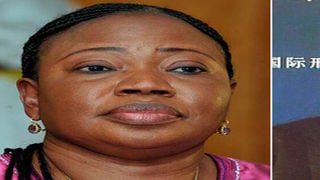
Former ICC Chief Prosecutor Fatou Bensouda (left) who was allowed to tighten her case against Kenyan lawyer Paul Gicheru (right) who is facing charges of witness interference.
| File | AFP & PoolNews
Premium
Bensouda blames lawyer Gicheru and Appeals Chamber for collapse of Ruto case
The International Criminal Court’s outgoing prosecutor Fatou Bensouda has blamed the Appeals Chamber and Kenyan lawyer Paul Gicheru for the collapsed trial of Deputy President William Ruto and radio presenter Joshua Sang.
Ms Bensouda said the decision of the Appeals Chamber to reject attempts by her office to rely on prior recorded testimony of witnesses who later recanted their evidence deprived the prosecution of key evidence that severely damaged its case.
Justice
She said eight prosecution witnesses withdrew from the case after being corruptly influenced by Mr Gicheru, who is facing charges against the administration of justice at the ICC.
Ms Bensouda is set to leave office next month and she will be succeeded by Mr Karim Khan, who represented Dr Ruto in the trial that collapsed six years ago.
"Indeed, offences such as these strike at the very heart of the court’s unique mandate to end impunity for the perpetrators of the most serious crimes of concern to the international community, by undermining investigations and prosecutions and allowing such persons to evade criminal liability, and denying justice to victims," said Ms Bensouda while urging the court to confirm the charges facing Mr Gicheru.
She said the collapse of the Ruto-Sang case involved an organised campaign by Mr Gicheru and his associates to corruptly influence prosecution witnesses over a number of months preceding and during the trial.
"It involved no fewer than eight prosecution witnesses and it contributed directly to the vacation of the charges in that case, following the withdrawal and recanting of a number of vital witnesses, preventing the Trial Chamber from determining the guilt or innocence of the accused on the strength of untainted evidence and ultimately denying justice to the victims of the post-election violence," she stated.
Essential role
In her view, Mr Gicheru bears particular responsibility “given the central and essential role he played in the commission of the offences, including as a direct perpetrator”.
She further denied that the investigators working on the case were duped by false witnesses who wanted to get financial benefit and get a life of ease under the court's witness protection programme.
Ms Bensouda said the money paid was for the reimbursement of expenses incurred as a result of the prosecution’s investigations, security expenses or support for relocated witnesses.
She dismissed claims by Mr Gicheru that she is using statements of false witnesses to pin him in the witness interference case.
The prosecutor said the lawyer is criminally responsible for corruptly influencing eight witnesses to recant their evidence.
She said the witnesses were influenced, either through promises of large payments or threats of harm — or a combination of the two.
"Through promises and actual payments of bribes, threats and intimidation, Gicheru and his associates perverted the course of justice in that case, directly contributing to its collapse," said Ms Bensouda.
She said while Mr Gicheru and his associates were not the only persons attempting to interfere with the case, their actions were the most harmful.
To achieve their ends, Ms Bensouda said, Mr Gicheru and his associates started by identifying and inducing persons with connections to her office investigation, and then leveraging their unique knowledge of and access to the witnesses.
"In some instances, witnesses were also induced to make false allegations attacking the credibility of other prosecution witnesses or the integrity of the prosecution and staff members of the Office of the Prosecutor. Once successfully corrupted, prosecution witnesses were then induced to contact further witnesses and the process was repeated," she said.
Ms Bensouda added that the volume and variety of evidence implicating Mr Gicheru in the bribery scheme is to comprehensive, compelling and mutually reinforcing to be explained away by criticisms of the credibility or reliability of witnesses.
In the early stages of the investigation, pressure was applied to suspected prosecution witnesses, largely by members of the Kalenjin community and prominent elders, she said.
However, as witnesses were moved away from the source of direct threats, other means of influence had to be found, and Mr Gicheru and his associates emerged as one of the chief purveyors of such corrupt influence.





